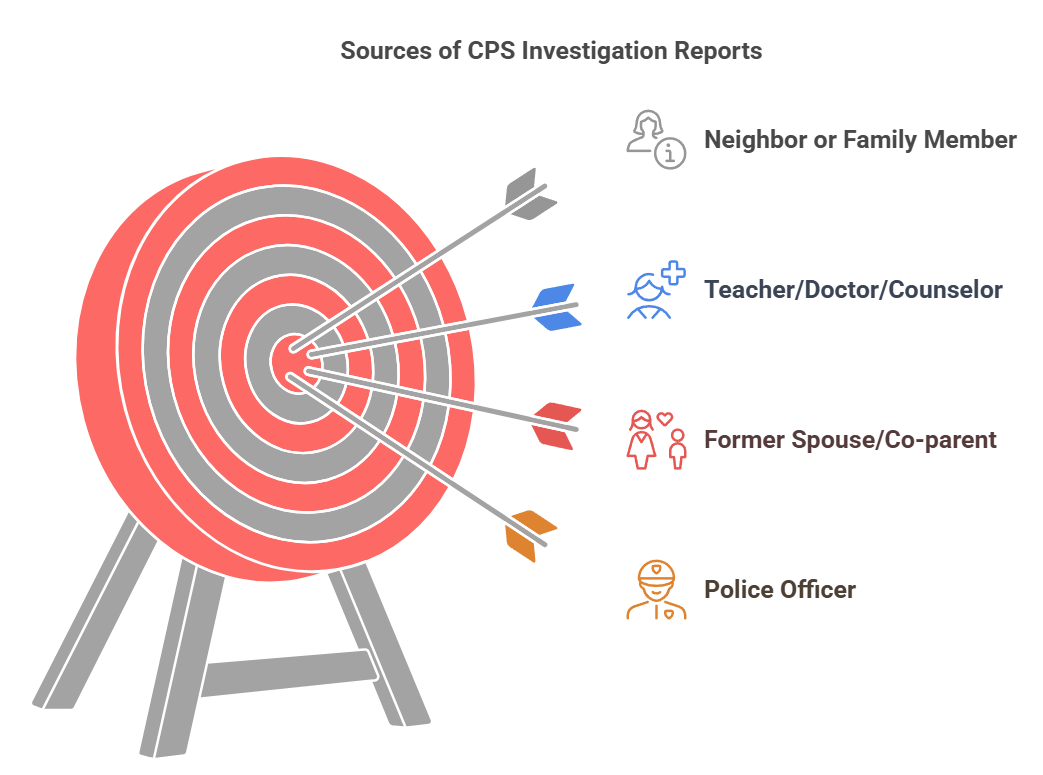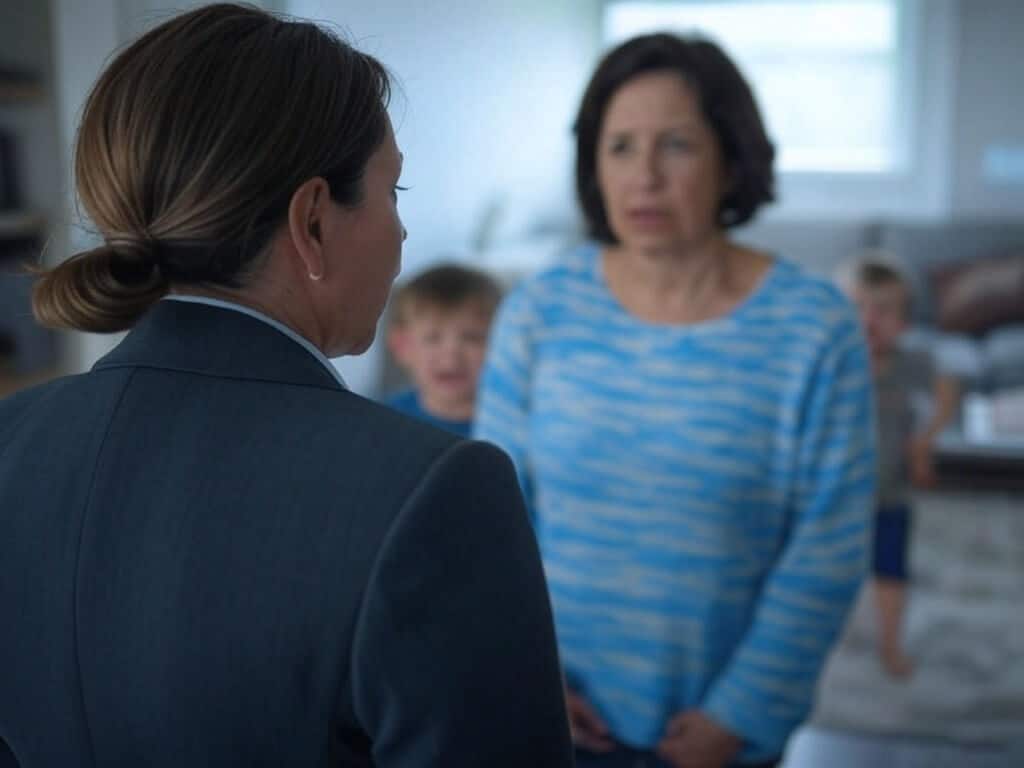What to Do If CPS Comes to Your House: Know Your Legal Rights, Protect Your Family, and Respond the Right Way in Texas
Few things are more stressful than opening your door to find Child Protective Services (CPS) standing outside, asking questions about your family. Whether you expected this visit or it comes as a complete surprise, knowing your legal rights in Texas can make all the difference in how you handle the situation.

CPS is responsible for investigating reports of child neglect or abuse, but their actions can sometimes be intrusive, stressful, and even legally questionable. As a parent, it’s important to understand how to protect your family, respond appropriately, and defend yourself against false allegations.
If CPS shows up at your home, don’t panic. Stay calm, know your rights, and take the right steps to protect yourself and your child. Let’s walk through everything you need to know about CPS investigations in Texas.
Why Would CPS Visit Your Home?
Few things are more unsettling than an unexpected knock at the door from Child Protective Services (CPS). You might feel caught off guard, confused, or even scared—especially if you have no idea why they’re there.
Your first thought might be, “Why is CPS at my house? Did someone make a false report? Am I in trouble?” It’s completely normal to feel overwhelmed in this moment. But before you assume the worst, take a deep breath. CPS is legally required to investigate every report they receive, even if the claims turn out to be false or exaggerated.

Understanding why CPS is involved can help you respond appropriately and avoid unnecessary stress. Let’s break down the most common reasons CPS might show up at your door—so you know exactly what you’re dealing with.
Common Reasons for CPS Investigations
CPS typically becomes involved after receiving a report of possible child neglect or abuse. This report can come from:
- A neighbor or family member who suspects something is wrong
- A teacher, doctor, or school counselor who is legally required to report any concerns
- A former spouse or co-parent in the middle of a custody battle
- A police officer responding to a domestic disturbance
It’s important to know that CPS must investigate every report they receive, even if the allegations are false, exaggerated, or made out of spite.
Do You Have to Let CPS Inside?
No, you do not have to let CPS into your home unless they have a court order or a warrant. CPS caseworkers sometimes imply that you must let them in, but unless there is an emergency situation (such as immediate danger to a child), they cannot force their way into your home without legal authority.
Can You Refuse to Speak with CPS?
Yes. You are not legally required to speak with CPS. However, refusing to talk to them altogether may raise suspicions. If they show up unexpectedly, you have the right to:
- Politely ask them for their name, badge number, and contact information
- Request time to consult with an attorney before answering questions
- Refuse entry into your home unless they present a court order or warrant
If CPS continues to pressure you, let them know you are willing to cooperate through your attorney to ensure your rights are protected.
What to Do When CPS Comes to Your House
When Child Protective Services (CPS) shows up at your door, your heart might start racing. You may feel defensive, confused, or even angry—especially if you believe the visit is based on false allegations. It’s easy to panic, but how you handle this moment can have a big impact on the investigation.

The most important thing to remember? Stay calm and know your rights. You don’t have to let CPS in, and you don’t have to answer questions on the spot. At the same time, you don’t want to escalate the situation by being uncooperative. The key is to protect yourself and your family while staying in control of the conversation.
Let’s walk through exactly what to do step by step so you can handle the situation with confidence.
1. Stay Calm and Be Respectful
Even if the visit feels unfair or invasive, do not get angry or hostile. CPS caseworkers have a job to do, and how you interact with them could impact their report. Remain calm, firm, and professional.
2. Ask for Identification
Always verify that the person at your door is a real CPS investigator. Ask to see their official ID badge and take note of their name and position. Scammers have been known to impersonate CPS workers, so this is an important step.
3. Know Your Rights Before Letting Them In
- If they do not have a court order or a warrant, you can legally refuse to let them enter.
- If they claim to have a court order, ask to see it before allowing them inside.
- If they have a warrant, do not resist, but take photos of it for your records.
4. If They Ask to Speak to Your Child Alone
CPS caseworkers may try to interview your child without you present. In Texas, they can do this at school or daycare without your permission. However, inside your home, you have the right to refuse.
If CPS insists on speaking to your child, you can:
- Ask why they need to speak to them alone
- Request that the conversation be recorded
- Inform them you prefer to have an attorney present
5. Gather Information About the Investigation
You have the right to know what you’re being accused of. Politely ask:
- What is the allegation? (They may not give full details, but they should give a general reason for their visit.)
- Who made the report? (CPS will not reveal the name of the person, but you may get clues based on the nature of the allegation.)
- What are the next steps in the investigation?
Write everything down, including the date, time, and what was said during the visit.
Your Rights When Dealing with CPS in Texas
If Child Protective Services (CPS) has contacted you, you might feel like you have no control over the situation. You may be asking, “Do I have to let them in? Can I refuse to talk to them? What are my legal rights?”

The truth is, you have rights, and it’s important to use them. CPS has a job to do, but that doesn’t mean they can overstep legal boundaries or violate your privacy. Many parents unknowingly give up their rights because they feel pressured, but you are not obligated to comply with every request they make.
Understanding your legal rights in Texas can help you protect yourself, your child, and your home while still handling the situation responsibly. Let’s go over what CPS can and cannot do—and how you should respond if they try to push beyond their legal authority.
Can CPS Enter Your Home Without a Warrant?
Only under the following circumstances:
- They have a court order or warrant
- There is an emergency situation where they believe a child is in immediate danger
Otherwise, they must have your permission to enter.
Do You Have to Answer Their Questions?
No. You are not required to answer CPS questions without consulting an attorney first. Be cautious about what you say—anything can be used in their report, even innocent statements that might be misinterpreted.
Do You Need a Lawyer Before Talking to CPS?
Absolutely. If CPS is involved in your life, it’s in your best interest to speak with an attorney who understands Texas family law.
What CPS Is Allowed (and Not Allowed) to Do
When Child Protective Services (CPS) is involved, it can feel like they have all the power—but that’s not true. CPS has rules they must follow, and they cannot do whatever they want.
Many parents mistakenly assume that if CPS shows up, they have to let them in, answer all their questions, or comply with every demand. But the truth is, CPS workers must operate within the law, and you have the right to push back when they overstep.
So, what exactly can CPS do—and more importantly, what are they NOT allowed to do? Let’s clear up some common misconceptions so you can stand your ground and protect your rights.
Can CPS Remove a Child Without a Court Order?
Only in emergency situations where they believe a child is in immediate danger. Otherwise, they must get a judge’s approval before taking any action.
How Long Does a CPS Investigation Last?
Most CPS cases are resolved within 30–45 days, but complicated cases can take longer.
What Happens If CPS Finds No Evidence of Abuse?
- The case is closed, and no further action is taken.
- In some cases, CPS may still offer voluntary services to the family.
How to Protect Your Family and Your Rights
When Child Protective Services (CPS) gets involved, emotions run high. You might feel anxious, frustrated, or even powerless—especially if you believe the allegations are false or unfair. But no matter what the situation is, you have rights, and there are steps you can take to protect yourself and your family.
The way you handle CPS from the very beginning can make a huge difference in how the investigation unfolds. Staying calm, knowing your rights, and keeping detailed records can help ensure that your side of the story is heard and that your family is treated fairly.
So what can you do to protect yourself? Here are the most important steps every parent should take when dealing with CPS.
Document Everything
Keep records of:
- CPS visits and conversations
- Any accusations made
- Any agreements or court documents
Know Your Rights When Dealing with CPS
- Do not sign anything without consulting an attorney
- Do not allow CPS to search your home without a warrant
- Do not agree to a voluntary safety plan without understanding the long-term consequences
What If CPS Wants You to Take a Drug Test?
CPS may ask you to take a drug test, even without evidence of substance abuse. You have the right to refuse, but refusal may be seen as suspicious. Speak with an attorney before agreeing to any test.
What to Do If CPS Takes Your Child
Few things are more terrifying for a parent than CPS removing your child from your home. Whether this was completely unexpected or you knew it was a possibility, you’re probably feeling a mix of panic, confusion, and anger. What happens now? Can you get your child back? What are your legal options?
First and foremost: Don’t lose hope. Just because CPS has taken your child doesn’t mean it’s permanent. You have legal rights, and there are steps you can take to fight for your child’s return. The key is to act quickly, stay informed, and get the right legal help.
Here’s what you need to know if CPS has removed your child—and what you can do to get them back.
Your Legal Rights After Removal
If CPS removes your child, you have the right to:
- Be informed of why your child was taken
- Attend all court hearings regarding your child’s placement
- Hire an attorney to fight for your parental rights
How to Get Legal Help
If you are facing a CPS investigation, it is critical to get legal representation. An experienced attorney can:
- Challenge false allegations
- Ensure CPS follows the law
- Fight for your parental rights
Final Thoughts: Protect Yourself and Your Family
CPS investigations can be stressful, confusing, and overwhelming, but knowing your legal rights in Texas is the first step in protecting yourself. Whether the allegations are false or based on a misunderstanding, how you handle CPS’s visit can impact your family’s future.
If CPS has contacted you, do not take risks with your rights. The Law Office of Nida Din PLLC is here to help. With experience in family law and CPS defense, we can guide you through the process, advocate for your parental rights, and help protect your family.
???? Contact the Law Office of Nida Din PLLC today for a confidential consultation. You don’t have to face CPS alone.
